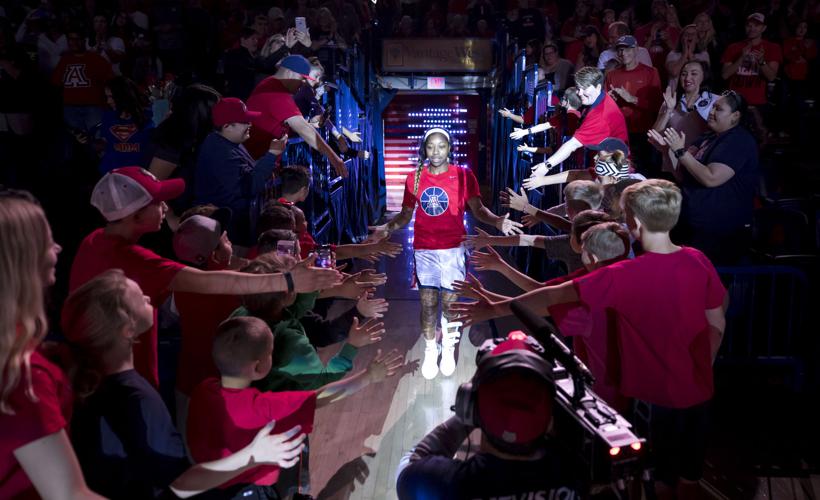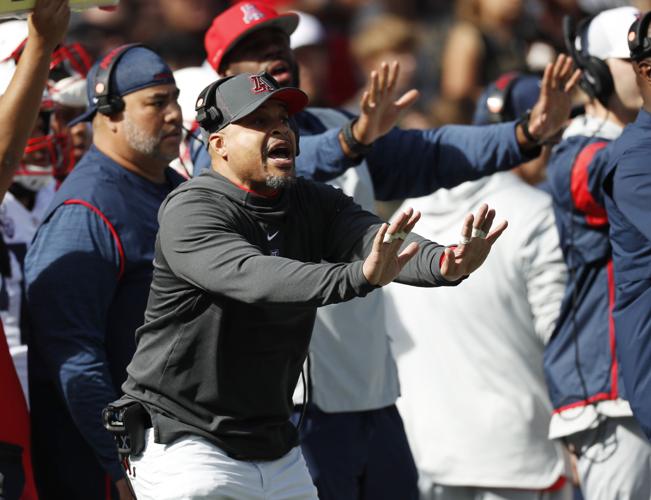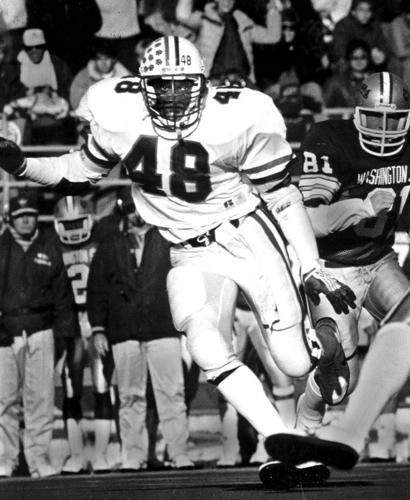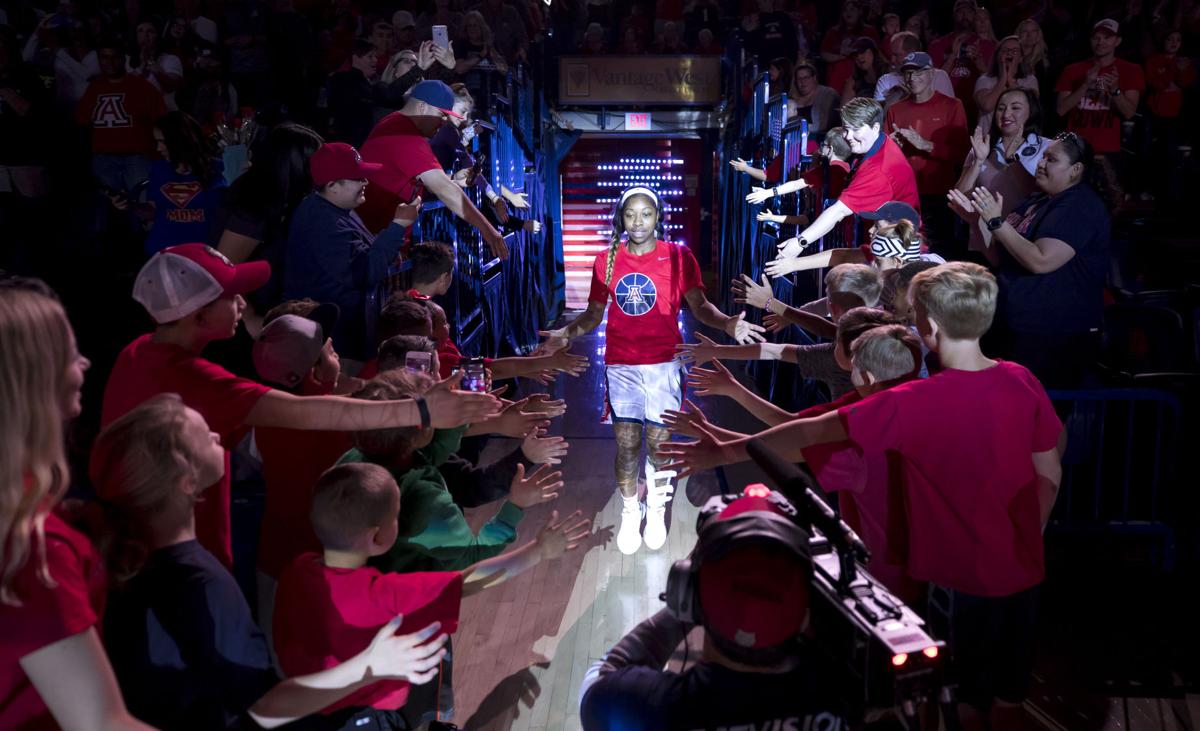Star columnist Greg Hansen checks in with the latest in women's basketball, college football coaches, high school hoops and more:
Profits aren't as important when it comes to Cats' rapid rise

Arizona guard Lucia Alonso (4), right, along with the Arizona Wildcats high-five the Arizona Women's basketball managers prior to No. 16 Arizona's 73-57 win over Southern California at McKale Center in Tucson, Ariz. on February 2, 2020.
There is no Selection Sunday for NCAA women’s basketball. Instead, it will be Selection Monday, March 16. The field and host sites for first- and second-round games will be revealed at 4 p.m. Tucson time on ESPN.
Arizona seems about as close as a lock possible to being a No. 4 seed and playing host to a No. 13, someone like Boise State or Dayton, at McKale Center on either March 20 or March 21.
But don’t expect McKale Center to overflow with 14,000 fans for those games. Expect maybe 7,000. That’s because ticket prices, set by the NCAA, will go from the regular-season general admission bargains of $5 and $8, to something close to $35-40.
It should give Arizona athletic director Dave Heeke valuable insight as to the market for women’s basketball in Tucson.
The Wildcats drew a school record 95,098 fans for the home season, or 5,944 per game. That broke the school’s attendance record by close to 3,300 fans per game. But the UA isn’t near to making a profit for women’s basketball.
“I’d like to hope we can do that someday, but I don’t know what the long game is,” said Heeke. “You’ve got to know your audience and know their (financial) capacity. Women’s basketball is a more price-sensitive crowd.”
The reality of women’s college basketball is that, according to Sports Business Daily, only three programs — UConn, Baylor and South Carolina — make a profit in women’s basketball. Arizona isn’t even close.
The annual budget for Adia Barnes’ program is $2.3 million, said Heeke. Revenues for the fiscal year 2019 were $1.05 million. If junior point guard Aari McDonald returns for her senior season in 2020-21, it’s not an exaggeration to think Arizona could contend for the Final Four, average 7,000 per game and continue to break attendance records.
Heeke said Arizona averaged about $30,000 at the gate per home game this year. That translates to about $500,000, not even a quarter of the women’s basketball expenses.
Bigger crowds means more game-day personnel. More ushers, more security, more people hired for traffic control. Higher game-day operations costs. More success leads to higher salaries for the coaching staff.
“I don’t think we can be revenue-producing in the next couple of years, no way,” said Heeke. “Even if we average 8,000 per game, that wouldn’t do it. Our tickets are $5 and $8. If we raise ticket prices to the $20 range, well, our fan base for women’s basketball has a lot of retirees and a lot of people on fixed incomes.”
There is no donor base to compare with the UA men’s program, which last year had revenues of $22.4 million.
The powerful Oregon Ducks broke the Pac-12 record for women’s basketball attendance this season, 10,852. But the Ducks won’t turn a profit. Their listed general admission prices for women’s basketball are $8 and $11. According to the U.S. Department of Education, Oregon’s budget for women’s basketball last year was $4.6 million with revenues at $1.4 million. The Ducks averaged 7,148 fans at Matthew Knight Arena in 2018-19.
But the good thing about women’s college basketball, which continues to reach popularity heights in the Pac-12 that once seemed impossible, is that it doesn’t have to become moneyball. It doesn’t have to chase the big dollars, as men’s basketball does.
It can be pure. It can follow the NCAA’s long-ago established ideals of amateurism. Isn’t it more fun that way?
Marathon trials spotlighted Tucsonans

Former Tucson High, Pima College and UA runner Abdi Abdirahman has written a book focusing on lessons he’s learned in track and life.celebrates after qualifying for his fifth U.S. Olympic team by finishing third Saturday at the U.S. Olympic marathon trials in Atlanta. He competed in the 2000, 2004, 2008 and 2012 Olympics.
The enduring news from the recent USA Olympic Marathon trials is that Tucsonan and 1997-98 Arizona All-American Abdi Abdirahman, 43, made the American team with a stirring run to the finish, qualifying for his fifth Olympics competition.
Not as many people focused on Tucsonan Aleta Jokisch, who finished 225th in the women’s Olympic Trials. It was a wonderful story anyway.
Jokisch, 29, who is a self-employed graphic designer in Tucson, is the assistant cross country and track and field coach at Salpointe Catholic High School. She helped the Lancers win the 2018 state cross country championship, and finish No. 2 last fall. Her personal running coach is Salpointe’s Mike Urbanski, a two-time state championship coach who made the USA Olympic Trials a special event for his Lancers girls team.
Urbanski and Jokisch took 15 Salpointe distance runners with them to Atlanta, including 2019 state champion Zoey Delgado, who recently accepted a scholarship from the University of San Diego. Jokisch, who was a varsity runner at the University of Montana, moved to Tucson two years ago when her husband, Morgen Hartford, became regional director of Southern Arizona Alzheimer’s Association.
Jokisch dedicated the race to her late sister, Lizzie, who died of cerebral palsy a year ago.
“I am really lucky to have her as an assistant coach; she’s a wonderful role model,” said Urbanski. “This was a once-in-a-lifetime experience for my distance kids. Plus, we actually got to cheer for people we know: Abdirahman, Bernard Lagat and (former St. Augustine High School state champion) Nico Montanez.”
In addition, Tucson registered nurse Sarah Sellers, who finished second at the 2018 Boston Marathon, ran a personal-best 2 hours, 31 minutes and 18 seconds and finished No. 11 overall.
Pima's Brian Peabody climbs to 600 career victories

Pima College coach Brian Peabody.
After winning three consecutive Region 1 championships, Pima College men’s basketball coach Brian Peabody took a bold step toward No. 4 last Wednesday when his rebuilding Aztecs stunned No. 1 seed Scottsdale Community College 71-69.
It was Peabody’s 600th career coaching victory in Tucson, dating three decades at Salpointe Catholic High School, Ironwood Ridge High School, Green Fields Country Day School, The Gregory School and now PCC.
He was unable to get No. 601 Friday when the Aztecs lost 105-96 to Glendale Community College. He was opposed in that game by first-year GCC coach Kenny Carillo, who, like Peabody, is a Salpointe Catholic and UA grad. Carillo and Peabody grew up playing basketball against one another in Tucson.
Rincon, UA grad Mack Rhoades, now at Baylor, named NACDA athletic director of the year

Baylor’s VP and Athletic Director Mack Rhoades, right, with Deputy Athletic Director Dawn Rogers, says: “Our coaches are a big part of (the Title IX program). Our coaches have to own this.”
When Baylor athletic director Mack Rhoades was growing up in Tucson, attending Rincon High School and graduating from the UA, one of his role models was Arizona athletic director Cedric Dempsey, who in 1994 became the executive director of the NCAA. Rhoades’ career path would make Dempsey proud; last week, Rhoades was named the athletic director of the year, 2019-20, by the National Association of College Directors of Athletics. He will be honored at the NACDA convention in June. At Baylor this school year, the Bears’ volleyball, women’s basketball and men’s basketball teams have all been ranked No. 1 at various times. Don’t count on Rhoades returning to Tucson to be Arizona’s AD any time soon, if a vacancy arises. He signed a 10-year contract with Baylor estimated to be worth $15 million last fall. …
Demetrice Martin is latest staffer to leave Cats

Arizona assistant coach Demetrice Martin directs the defense against Colorado in the first half of an NCAA college football game Saturday, Oct. 5, 2019, in Boulder, Colo. (AP Photo/David Zalubowski)
Kevin Sumlin’s original coaching staff at Arizona continues its exodus. Secondary coach Demetrice Martin bailed out to become Colorado’s secondary coach last week, becoming the sixth Sumlin coach to leave Tucson. What made Martin’s departure so sensitive is that he went to a Pac-12 South division rival. Since Larry Smith left Arizona to become USC’s head coach in 1987, taking most of his staff with him, only four UA assistant football coaches have jumped to more secure jobs within the league: secondary coach/defensive coordinator Greg Brown and defensive line coach Mike Tuiasosopo to Colorado in 2010, special teams coach Charlie Ragle to Cal in 2017 and offensive line coach Jim Michalczik to Oregon State in 2018. All four correctly anticipated that the future at Arizona under Mike Stoops and Rich Rodriguez was not secure and were able to get new contracts inside the league. Martin knows how fragile the life of assistant coaches are in college football; he was part of the UCLA staff under Jim Mora that was let go after Mora’s 2017 firing. ….
Kenny Cardella was special
Sad to learn of the death of Kenny Cardella, 88, on Feb. 17 in Tucson. Cardella completed his Arizona football career as the school’s No. 2 rusher, with 2,060 yards in 1951-53. His final game as a Wildcat was a game to remember: he set the UA single-game record by rushing of exactly 200 yards in a 1953 victory over ASU; Cardella was No. 3 in the NCAA in rushing that season. He was an All-Border Conference choice in 1952 and 1953 and as good as Cardella was in football, his post-UA life was even more impressive. He was a pilot for American Airlines and then started and operated Cochise Airlines from 1972-81. He retired in Tucson after a productive career in commercial real estate. Not bad for a young man from Los Angeles who drove across the desert in the summer of 1950 hoping he had made the right choice by leaving home to attend the UA.
Ex-Wildcat Byron Evans returns to South Mountain as new head coach

Byron Evans watches a play develop during the 1986 game against Washington State.
From 1984-86, Byron Evans rivaled Chuck Cecil, Ricky Hunley and Tedy Bruschi as one of the four greatest football players in UA history. In 1985, the linebacker from Phoenix South Mountain High School set a record for unassisted tackles, 118, that could last for a century or more. Even Scooby Wright in 2014, with 99 unassisted tackles, couldn’t threaten Evans’ record. Last week, Evans returned to South Mountain to be its head football coach. After playing nine years for the Philadelphia Eagles, Evans returned to his home turf, got married, had three kids, worked as a pastor and from 2014-18 was the head football coach of ASU Prep as well as a member of the school’s faculty. It wasn’t easy starting the ASU prep football program; Evans’ teams went 9-39. Evans knows what it is to take on a challenge: when he arrived at Arizona in 1983, his only other scholarship offer was from New Mexico State. Four years later, Evans was the Pac-10 defensive player of the year. …
Alyssa Brown's record-setting season leads to Gatorade award

Tucson Sahuaro's Alyssa Brown (44) advances the ball up court as Chandler Seton Catholic's LeeLee Willis defends during the second half of the 4A girl's state championship basketball game in Phoenix on Saturday, Feb. 29, 2020.
Sahuaro High School junior forward Alyssa Brown, who averaged what is believed to be a Tucson record 31.4 points for girls prep basketball, was named Arizona’s Gatorade Player of the Year Friday. Her team, coached by Steve Botkin, went 28-2 and reached the Class 4A state title game. Brown becomes the third Tucsonan girls player to win the Gatorade POY award, following Salpointe Catholic’s Sybil Dosty, 2004, who went to Tennessee and ASU, and Sahuaro’s Suzanne Zahasky, 1990, who went to Fresno State. What’s so impressive about Brown is that she has a 3.9 GPA. Botkin said that Brown will play for Arizona Supreme’s traveling AAU team this summer, as well as for Sahuaro’s summer league team that will play in Phoenix, San Diego and Las Vegas in May and June. Dosty went on to be a coach at, among other spots, ASU, Nevada and Fresno State. Zahasky is now a math teacher near San Francisco. …
Ex-Aztec Abram Carrasco is league's player of the year
Pima College’s 2019 first-team NJCAA All-American point guard Abram Carrasco, a Cholla High School grad, continued his excellence this season. He was named the Golden State Athletic Conference player of the year, averaging 18.1 points for NAIA Westmont College. Carrasco’s team, ranked No. 6 nationally, lost in the GSAC semifinals Friday and now awaits the NAIA tournament seeding.
My two cents: When it comes to coaches, body of work trumps state titles
Salpointe Catholic High School, which fielded its first boys basketball team in 1951, won the Class 4A state championship last weekend. Talk about a long wait.
Before coach Jim Reynolds ended the long shutout, the Lancers finished No. 2 at state in 1997, 1999, 2013 and 2018. That 0-for-5 streak in the year’s biggest game would seem to be a record for heartache that no Tucson school or coach could understand.
But in Tucson prep basketball history, Santa Rita High School knew similar frustration. Under coaches Boyd Meyer, Dave Lynch, Mel Karrle and Jim Ferguson, Santa Rita finished No. 2 in state in 1972, 1979, 1992, 2005, 2007, 2008 and 2009. Fortunately, Ferguson coached Santa Rita to the 1999 and 2010 state championships, and was soon inducted into the Pima County Sports Hall of Fame.
And then there is Rincon High School. After esteemed coach Dick King coached the Rangers to the 1965 state championship, the Rangers lost in the finals in 1967, 1975, 1976 and 1978, the latter three under Bill Mehle, one of the top prep basketball coaches in Arizona history.
And then, in 2006, Rich Utter coached Rincon to the state title game, losing a close game to Glendale Apollo. Utter and Rincon haven’t given up; Utter is expected to coach Rincon for a 33rd season in 2020-21. He has coached the Rangers to 457 victories and, if we are fortunate, will stick around to win No. 500.
Top Salpointe basketball coaches like Gary Heintz, Jim Flannery and Brian Holstrom never knew the joy of winning a state title. But I believe the body of work by coaches such as Rich Utter trumps winning a state championship anytime.












